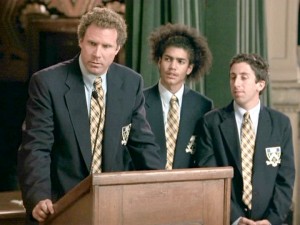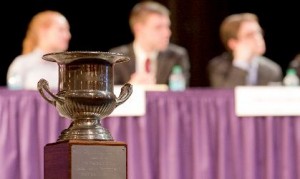Laying down the gauntlet – Mathematical Wrangles
Poetry slams, rap battles and Mock The Week all pit the sharpest minds with the sharpest tongues against other (well, two out of three do).
Opponents must outdo each other through rounds of linguistic duelling, with escalating wit and dexterity. One of my favourite slam poets is Taylor Mali and his incredible ‘What Teachers Make?’ Have a look at the video if you’ve never seen it.
I came across another variety of this kind of thing for the first time the other day, courtesy of @dannytbrown Head of Maths at Greenwich Free School – Mathematical Wrangles. These wrangles are a cross between the UKMT team competitions and Oxford Union debates. The official rules are reproduced below but first a quick mention of ‘Senior Wranglers’.
Senior Wranglers (from Wikipedia) – “The Senior Wrangler is the top mathematics undergraduate at Cambridge University, a position once regarded as “the greatest intellectual achievement attainable in Britain.” Specifically, it is the person who achieves the highest overall mark among the Wranglers – the students at Cambridge who gain first-class degrees in mathematics. The Cambridge undergraduate mathematics course is famously difficult. Many Senior Wranglers have become world-leading figures in mathematics, physics, and other fields. Senior Wranglers were once fêted with torchlit processions and took pride of place in the University’s graduation ceremony. Years in Cambridge were often remembered in terms of who had been Senior Wrangler that year.”
Rules for Mathematical Wrangles
These rules have been cut and pasted without a word edited from http://wolfweb.unr.edu/homepage/keppelma/documents/WrangleRulesRevisedJMM2011.pdf
The rules below broadly follow those of a Mathematical Battle as given in Appendix A of Mathematical Circles (Russian Experience) by Fomin, Gengkin and Itenberg. Adaptation provided by Sam Vandervelde and Jon Ziegler. Further adaptation by Steve Dunbar in November 2010.
Preliminaries

- A Mathematical Wrangle occurs between two teams of students, each with three students per team.
- From a preset pool of problems the judge draws 8 problems. The solution to each problem will involve an explanation (not just a numerical answer) which requires a relatively short amount of time to present. Problems should span a range of topics and difficulty levels.
- Immediately prior to the Wrangle each team is sequestered for an hour to work on the problem set as a team.
Procedures
- A jury consisting of two judges keeps time, decides scores, and presides over the Wrangle. The decisions of the judges are final.
- Each team selects a captain, who serves as spokesperson for the team.
- The Math Wrangle commences with a coin flip. One team is designated as Heads and the other team Tails by the judges who then flips the coin. The team designated by the result of the coin flip decides whether to begin with the right to challenge.
- At each stage of the Wrangle the team with the right to challenge chooses a problem from among those that have yet to be presented and challenges the opposing team to present a solution. The captain announces the problem challenge on behalf of the team. After the initial problem challenge and presentation, the right to challenge alternates between the two teams.
- When challenged, the opposing team may choose to accept the challenge, in which case they present a solution. They may also opt to return the challenge, in which case the original team must attempt to present a solution. The potential point value of a returned challenge increases, see the scoring below.
- The team presenting a solution nominates a member who has spoken at most once to provide an explanation. This person has up to five minutes to present as complete a solution to the problem as they are able. Time spent drawing diagrams or writing equations on the board is included in the five minutes.
- The presenter may have 2 minutes to discuss the problem with their team prior to stepping to the board, but may not consult with their team while describing their solution. Furthermore, the presenter should address only the given problem, without discussing generalisations or other extensions of the problem.
- The other team then selects a member who has spoken at most once to respond to the solution just presented. This person has up to three minutes to give a rebuttal. A rebuttal points out any flaws or omissions in the explanation or illustrates how that explanation might be shortened or made more elegant. The rebuttal must address the solution presented. In particular, an alternate solution should not be given in a rebuttal.
- On the other hand, the responder may concede that the solution is complete (or close enough) As with the presentation of the solution, the team member can discuss the response for two minutes with their team, but may not consult with their team while speaking.
- Once both teams have discussed the chosen problem the judges announces scores as described below.
- Each problem is initially worth 7 points. Assuming that a team accepts a challenge to solve a problem and the other team then provides a rebuttal, the judges will award a portion of the available 7 points to each team based on their progress. For instance, if the rebuttal indicates how to finish an incomplete proof, the judges would split the points between the teams as warranted. On the other hand, the judges might award 0, or just a portion of the total points if neither team makes significant headway on a problem.
- Once 6 problems have been presented the Mathematical Wrangle comes to a close. The judges announce the final scores and declares a victor.

Etiquette
- Presenters should speak loudly and clearly, and avoid speaking into the board. For large rooms, the use of a microphone is strongly encouraged. Presenters should also address their solution to the judges. In particular, a rebuttal should be directed to the judges, as opposed to the other team. Team members should listen attentively or consult with one another quietly as solutions or responses are being presented. Heckling or interrupting is prohibited.
- A rebuttal should refer respectfully to the work done by their peers. For instance, a response might begin “The opposing team has made significant progress towards a solution to this problem. I would now like to propose a nice approach that circumvents the algebraic difficulties they encountered.”
- All students should honour the decisions made by the judges, who will act impartially to the best of their ability and encourage all team members in their efforts.
Strategy
- It is generally a good idea for team members to understand solutions to multiple problems. Teams might also choose to appoint an expert for each problem.
- In theory a team should challenge with a problem which they already understand, but a team may select a problem they have not solved.
- Should a team return a challenge, then the problem increases in value to 10 points. The allocation of points then proceeds as before.
- A team that is challenged to solve a particular problem is faced with a dilemma if they do not have a solution. If they accept the challenge anyway, then they lose the opportunity to score a full 7 points, although they might have at least a partial solution. However, if they return the challenge and the original team has a proof, then they might fall behind by up to 10 points. If the challenging team was bluffing without a solution and has the challenge returned to them, then the rebuttal has passed to the originally challenged team, so they will still have an opportunity to present a solution. Therefore, accepting or returning a challenge requires insight into the difficulty of a problem and the capability of the opposing team.
- Prizes (when provided) are distributed to all team members equally. It is also recommended that everyone celebrate together afterwards, preferably with delicious snacks.

Rules end.
No doubt someone’s going to tell me this has been going on forever and I’m behind the times. Keep up Bruno!